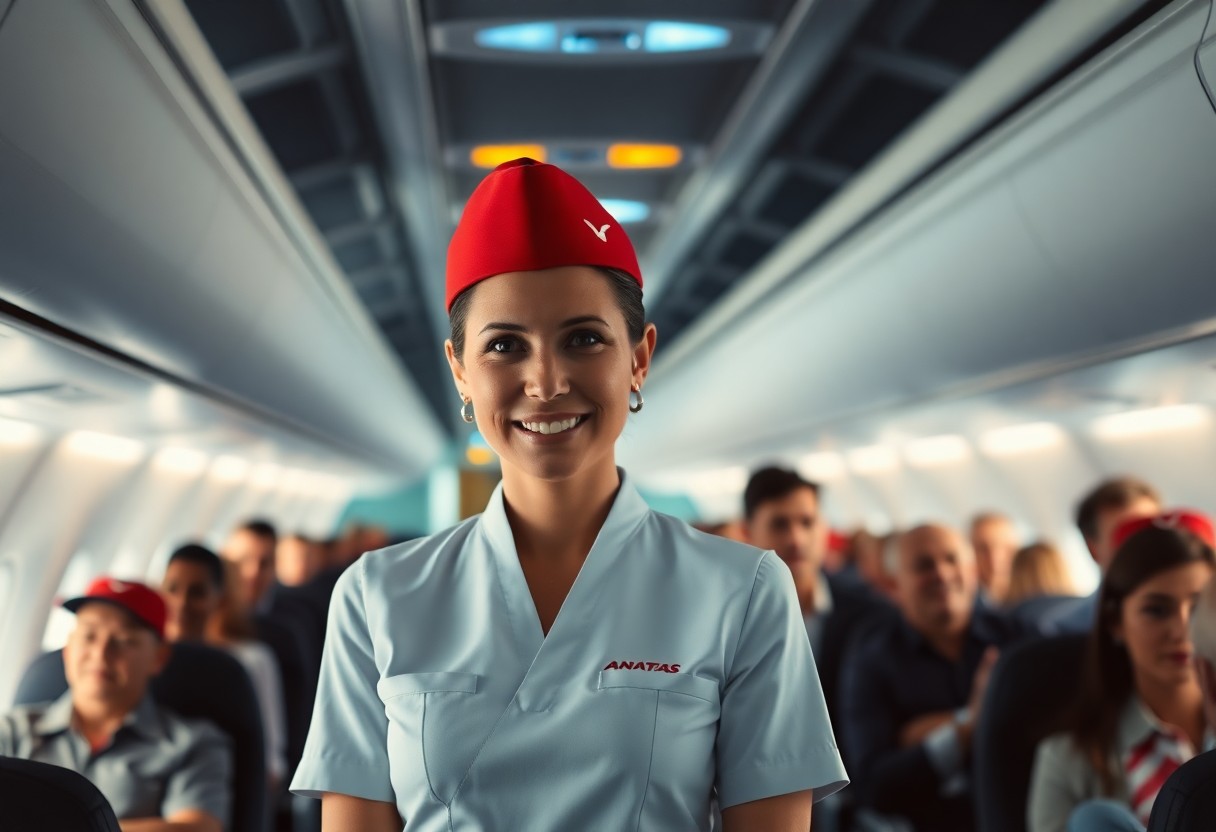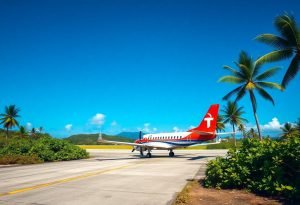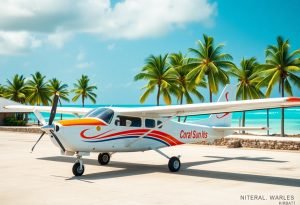Most people dream of working in the skies, and as a member of the Qantas Airways cabin crew, you’ll play a vital role in providing exceptional service to travelers across the globe. This post will guide you through the important steps and requirements needed to join this prestigious airline, highlighting what you can expect during the application process, training, and day-to-day responsibilities. Whether you’re seeking a new career path or a chance to fly high, this comprehensive guide will help you navigate your journey to becoming a Qantas cabin crew member.
Key Takeaways:
- Qantas Airways cabin crew play a vital role in ensuring passenger safety and comfort during flights, adhering to rigorous training and safety protocols.
- The team is recognized for providing high-quality customer service, contributing significantly to the airline’s reputation for excellence within the aviation industry.
- Crew members are trained to handle a variety of situations, including emergency protocols, first aid, and customer service challenges, showcasing their versatility and professionalism.
Overview of Qantas Airways Cabin Crew
Before you step into the world of Qantas Airways cabin crew, it’s imperative to understand the pivotal role they play in ensuring a seamless flight experience. This esteemed airline prides itself on its commitment to customer service and safety, with a cabin crew dedicated to making your journey comfortable and enjoyable. Their training and expertise equip them to handle a wide range of situations, enhancing your flight experience with professionalism and care.
Roles and Responsibilities
Clearly, the roles and responsibilities of Qantas Airways cabin crew extend beyond serving meals and drinks; they are fundamental to passenger safety and comfort. You will find cabin crew members conducting pre-flight safety checks, providing emergency assistance when necessary, and ensuring compliance with all airline regulations. Their ability to manage in-flight service and address passenger needs plays a crucial role in creating a positive atmosphere during the flight.
Qualifications and Training
With a focus on high standards, Qantas Airways cabin crew must meet specific qualifications and undergo rigorous training to succeed in their roles. This ensures you receive service from individuals equipped with the skills and knowledge necessary for safety and customer care.
Crew members participate in comprehensive training that covers everything from emergency procedures to customer service excellence. You will initiate on learning imperative skills such as first aid, safety protocols, and conflict resolution, allowing you to feel secure and well-cared for during your flight. Ongoing professional development is also emphasized, ensuring that crew members stay updated with the latest procedures and practices in the aviation industry.
How to Become a Qantas Airways Cabin Crew Member
It’s an exciting journey to become a Qantas Airways cabin crew member, and it all begins with meeting the eligibility criteria, which includes having a strong customer service background, being at least 18 years old, and possessing excellent communication skills. Passion for travel and an eagerness to provide exceptional service are key attributes that will help you stand out in the competitive application process.
Application Process
Member applications typically start by submitting your resume and cover letter through the Qantas Careers website. Be sure to highlight your relevant experience and skills. After your application is reviewed, selected candidates will be invited to participate in assessment days where they will undertake various exercises to showcase their ability to work within a team and handle customer interactions effectively.
Interview Tips
Some effective tips for excelling in your interview include preparing thoroughly and understanding Qantas’s values and culture, as it will reflect your alignment with the company. Focus on showcasing your interpersonal skills and experiences through examples. You may also consider the following points:
- Practice common cabin crew interview questions.
- Dress professionally to make a strong first impression.
- Be confident in your answers, and use the STAR method (Situation, Task, Action, Result) to structure your responses.
Assume that your enthusiasm for the role will shine through, demonstrating your commitment and passion for joining the Qantas team.
Cabin crew interviews often assess not just your qualifications but also your personality and cultural fit within the Qantas family. You should be prepared to exhibit your adaptability and conflict resolution skills as part of the evaluation. Here’s what you can do to ensure success:
- Research Qantas’s history, fleet, and service excellence to show your passion for the airline.
- Engage with interviewers by asking insightful questions about the crew’s role and responsibilities.
- Express your commitment to safety and customer service as these are paramount in this industry.
Assume that demonstrating a genuine interest in providing exceptional passenger experiences will contribute positively to your interview performance.
Essential Skills for Cabin Crew
Many aspiring cabin crew members often overlook the diverse skill set required for success in this role. From effective communication to quick-thinking problem-solving, these imperative skills not only enhance passenger experience but also ensure safety and efficiency during flights. Understanding and developing these competencies can set you apart in your journey to becoming a valued member of Qantas Airways’ cabin crew.
Communication Skills
Skills in communication are at the heart of cabin crew responsibilities. You must convey important information clearly and concisely to passengers and team members. Your ability to listen actively, address queries, and provide reassurance creates a welcoming atmosphere in the cabin, enhancing overall customer satisfaction. Developing your verbal and non-verbal communication skills is imperative in ensuring every passenger feels valued and informed during their journey.
Problem-Solving Abilities
You will encounter unexpected situations that require quick and effective solutions. Whether it’s addressing a passenger’s medical need or resolving a seating issue, your problem-solving abilities are tested continually. Being equipped with the tools to think critically and act swiftly is vital in maintaining a positive flight experience for everyone on board.
Abilities to analyze situations and develop solutions efficiently contribute significantly to the overall safety and comfort of passengers. You should cultivate a mindset that embraces challenges and fosters creativity in problem-solving. Engaging in role-playing scenarios during training can help sharpen these skills, preparing you for any situation that may arise during a flight. Ultimately, your capacity to navigate challenges will enhance not only your performance but also the reputation of Qantas Airways as a leader in customer service.
Factors Affecting Cabin Crew Performance
Once again, cabin crew performance is influenced by several factors that can enhance or hinder their ability to provide exceptional service. Understanding these aspects can help you appreciate the complexities of their role:
- Training and experience
- Health and well-being
- Working conditions
- Team dynamics
- Passenger interactions
Any one of these factors can significantly impact the quality of service you experience on a flight.
Working Conditions
The working conditions of cabin crew play an vital role in their performance. Factors such as flight duration, schedule irregularities, and the physical environment within the aircraft can affect their ability to perform efficiently and maintain a positive demeanor throughout the journey. When conditions are more favorable, you will likely notice that cabin crew are more attentive and responsive to your needs.
Passenger Interactions
Conditions can also greatly influence how cabin crew engage with passengers. The nature of these interactions can range from providing information to resolving conflicts or delivering personalized services. Your demeanor as a passenger, along with the atmosphere aboard the flight, can shape these exchanges.
Performance during these interactions hinges on the cabin crew’s ability to remain calm, empathetic, and efficient. When facing challenging situations, such as delayed flights or difficult passengers, their training and experience come to the forefront, allowing them to manage conflicts and maintain customer satisfaction. Understanding this dynamic helps you appreciate the pressures they endure while striving to create a positive flying experience for everyone on board.
Tips for Successful Cabin Crew Experience
Despite the challenges often faced by cabin crew members, there are effective ways to ensure a rewarding experience. Consider these tips for navigating your journey:
- Prioritize communication with your team.
- Stay organized and manage your time efficiently.
- Embrace the diverse cultures you encounter.
- Focus on your personal wellness and health.
This approach will enhance not only your performance but also your enjoyment of the role.
Managing Work-Life Balance
Balance is necessary for maintaining your well-being as a cabin crew member. With irregular schedules and long hours, finding ways to create personal time can significantly improve both your job satisfaction and overall happiness. Embrace downtime by engaging in hobbies, spending time with loved ones, or simply relaxing to recharge for your next flight.
Continuous Learning and Development
You should always seek opportunities for growth within your cabin crew position. Staying informed about industry changes, attending workshops, and pursuing additional training can profoundly impact your career trajectory. Continuous learning allows you to adapt, improve your skills, and remain competitive in the ever-evolving aviation sector.
Experience in the cabin crew role is enriched by actively seeking development opportunities. Engaging with mentorship, enrolling in training sessions, or participating in refresher courses ensures you stay at the forefront of industry standards. Being proactive about your professional growth not only enhances your skills but can also lead to advancement within your airline.
Career Advancement Opportunities
Now that you’ve commenceed on your journey with Qantas Airways, understanding the career advancement opportunities available to you is crucial. The airline offers a structured pathway for growth, allowing you to climb the ranks and develop your skills further. By actively seeking out these opportunities, you can enhance your experience and play a significant role in the airline’s success.
Internal Promotions
With dedication and hard work, you can benefit from internal promotions within Qantas Airways. The airline values home-grown talent and frequently offers its cabin crew the chance to move into leadership roles or specialized positions. By showcasing your abilities and leadership potential, you position yourself favorably for these advancement opportunities.
Specialization Options
To further your career with Qantas Airways, you can explore various specialization options tailored to your interests and strengths. This allows you to not only enhance your professional skill set but also contribute to the airline’s diverse operational needs.
Advancement in your career can take many shapes at Qantas, particularly through specialization options such as inflight service management, training roles, or targeting other operational areas. By choosing a path that aligns with your passions, you not only grow personally but enhance your contributions to the quality of service the airline is known for. Emphasizing continued learning and attaining relevant qualifications can further facilitate your success in these specialized roles.
To wrap up
With these considerations, you can appreciate the vital role that Qantas Airways cabin crew play in ensuring a pleasant flying experience. Their extensive training and commitment to safety, customer service, and teamwork not only enhance your journey but also uphold the airline’s reputation for excellence. As you travel, recognizing their efforts can deepen your understanding of the complex operations behind each flight, making your time in the air even more enjoyable.
Q: What are the primary responsibilities of Qantas Airways cabin crew?
A: The primary responsibilities of Qantas Airways cabin crew include ensuring the safety and comfort of passengers during flights. This role involves conducting pre-flight safety checks, providing pre-flight safety demonstrations, serving food and beverages, responding to passenger inquiries, and managing any in-flight emergencies. Additionally, cabin crew members are responsible for maintaining cabin cleanliness and providing assistance to passengers as needed, ensuring a pleasant travel experience for everyone on board.
Q: What qualifications and training are required to become a cabin crew member for Qantas Airways?
A: To become a cabin crew member at Qantas Airways, applicants typically need to be at least 18 years old and possess a high school diploma or equivalent. Previous customer service experience is highly valued. Once hired, candidates undergo extensive training that includes safety procedures, emergency evacuation training, first aid, and customer service skills. This training prepares cabin crew members to effectively handle various scenarios they might encounter during flights.
Q: How does Qantas Airways promote career development for its cabin crew members?
A: Qantas Airways is committed to the ongoing career development of its cabin crew members. The airline offers opportunities for advancement through various programs, including leadership training and specialized skills workshops. Employees are encouraged to pursue further education and gain additional certifications that can enhance their career prospects within the company. Additionally, Qantas provides pathways for cabin crew to transition into other roles within the airline, such as becoming a flight operations manager or a trainer for new recruits.



